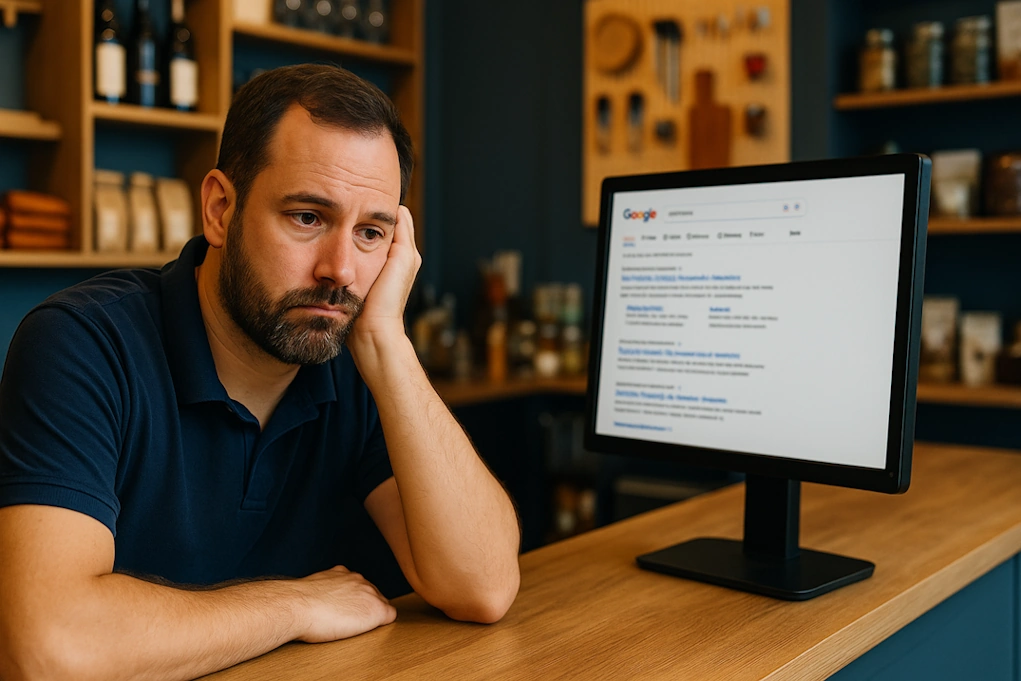It’s Here. And It’s Not Going Anywhere.
How AI is Changing Search
Is AI changing the role of the web design company? Artificial intelligence is reshaping how sites are built, but does it replace designers or make them stronger?
What is AI and How Does Affect Your Business Online?
Has your website traffic dropped lately? You’re not imagining it. Even if your site ranks high, fewer people may actually be clicking through. Unless you’ve been under a rock or in witness protection, you’ve probably heard of AI. But what is it, really?
In plain English, AI is software that learns from massive amounts of data and tries to predict the most useful answer to a question. It doesn’t “think” like a human, but it’s really good at sounding like it does. And right now, it’s changing the way people search online.
For small business owners, that shift matters. A lot. AI is stepping between your website and your customers, and if you’re not aware of how that works, you risk becoming invisible.
A Historic Shift in Search
For the first time in 22 years, Apple revealed that Google searches inside Safari actually dropped. Eddy Cue, Apple’s head of services, said people are skipping Google and turning to AI tools like ChatGPT and Perplexity instead.
Google disagreed and said overall searches are still growing. But whether you believe Apple or Google, the fact that Safari searches dipped at all is huge. It has never happened before. That alone should get every business owner’s attention.
The Click Problem
Even when people use Google, fewer of them are clicking results. AI overviews now appear above the fold, pushing websites further down the page.
Pew Research found that when a Google AI summary appears, users click normal results only 8% of the time compared to 15% without one. That’s nearly cutting clicks in half.
And here’s the kicker: when AI boxes show up, 26% of searches end without a single click. No website visit, no lead, nothing.
Other studies confirm it. Sites that used to sit comfortably in the number one spot can lose up to 79% of their traffic when an AI box pushes them down [link: The Guardian]. Imagine working for years to earn that #1 rank, only to have four out of five clicks vanish.
When Big Media Loses, Everyone Loses
This isn’t just a small business problem. Even major publishers are feeling it.
Penske Media, the company behind Rolling Stone and Variety, sued Google this year. They claim Google’s AI overviews cut their affiliate revenue by more than one-third.
The New York Times has also sued OpenAI and Microsoft, accusing them of using Times content to train AI without permission and then spitting out answers that keep readers from visiting the Times website. A group of U.S. newspapers filed similar lawsuits.
If media giants with millions of daily readers are struggling to hold onto clicks, small business sites don’t stand a chance unless they adapt.
The Awkward Truth: Nobody Has the Playbook
Here’s the truth: there are no AISEO experts.
AI is advancing faster than anyone can track, and even the companies building it can’t fully explain why it pulls one answer over another. So when someone claims to have the secret to “dominating AI search,” take it with a whole shaker of salt.
AI doesn’t reward clever taglines or fluffy promises. It rewards clarity. It looks for structured information it can summarize and cite. If your site makes that easy, you stand a better chance of being included in AI answers.
What Small Businesses Can Do Right Now
So how do you stay visible? There’s no magic formula, but here are a few key steps:
1. Write Clearly and Directly
Skip the buzzwords. If you’re a plumber in Greensboro, say “Licensed plumber in Greensboro, NC, available 24/7.” That’s the kind of text AI can understand and reuse.
2. Use Schema Markup
Schema is behind-the-scenes code that tells search engines what your content means. Reviews, business hours, FAQs, and location info should all be marked up. It’s free, and it helps AI know what to trust.
3. Strengthen Local Signals
Reviews, accurate addresses, and consistent listings across directories make your business look credible. If you want to show up for “near me” searches, local signals matter more than ever.
4. Publish Real Content
AI can’t cite what doesn’t exist. Create FAQ pages, blog posts, and service explanations. Without that, you’ll be invisible no matter how nice your homepage looks.
5. Move Faster Than the Big Guys
Small businesses have one advantage: speed. You don’t need endless meetings and approval chains to make updates. That agility can put you ahead of bigger, slower competitors.
The Bottom Line
Search is no longer about fighting for the number one blue link. It’s about becoming part of the answer.
Nobody can guarantee you traffic in this new world. But if you’re clear, trustworthy, and locally visible, you’ll give yourself the best chance of showing up where customers are looking.
And remember, I’m not writing this from a corner office in Silicon Valley. I’m sitting on my couch and one of my own articles was cited in Google’s AI overview alongside industry heavyweights. If AI can quote me, it can quote you too.
TL;DR: How AI is Changing Search
Apple says Safari searches on Google dropped for the first time in 22 years, and studies show AI summaries are cutting clicks in half while pushing even #1 sites down the page. Publishers like Rolling Stone and The New York Times are suing over lost traffic, and small businesses are feeling it too. Nobody has the playbook for AI search, but if your site is clear, local, and full of useful content, you’ll stand a much better chance of showing up.

Shea Forbis is the founder of Carolina Web Pro, a Burlington-based web design company. With more than 14 years of experience in web design, SEO, and digital marketing, he helps small businesses build websites that perform and compete online.







